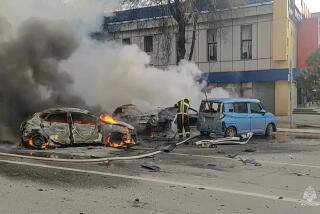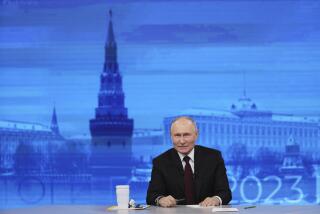Russian economy hit by Ukraine fallout; 0% growth in 2014 possible
Russia’s economy has been hit hard by the Ukraine crisis, prompting finance officials to cut growth forecasts for this year to near zero and draining the country’s hard currency reserves as investors flee an uncertain market, Kremlin officials disclosed Wednesday.
In an address to the lower house of parliament, Economic Development Minister Alexei Ulyukayev said $63 billion had been converted from rubles to hard currencies and taken out of the country in the first quarter of this year.
If that pace of capital flight continues, Russia could easily surpass the $120 billion lost at the height of the global economic crisis six years ago.
“The acute international situation of the past two months” was to blame, Ulyukayev said, referring to the unrest in neighboring Ukraine following the Feb. 21 ouster of President Viktor Yanukovich, a Kremlin ally. Russian troops then seized the strategic Crimean peninsula from Ukraine, raising the threat of international sanctions on Russia’s vital energy trade.
The Russian stock market dropped 10% last month, wiping out further billions in capital. The ruble has lost 9% of its value since the start of the year, boosting prices for the imported food and manufactured goods on which the Russian consumer market is heavily dependent.
Western nations so far have imposed only limited sanctions on Russian officials and businessmen for what the international community has condemned as aggression and a breach of international law in annexing Crimea.
But as an estimated 40,000 Russian troops are poised on Ukraine’s border, and President Vladimir Putin has vowed to protect ethnic Russians in Ukraine “by any means,” the United States and the European Union have warned that any further territorial seizures by Russia will be punished with more biting sanctions like boycotts of Russian oil and gas imports.
The European Union is Russia’s largest trade partner and the biggest customer for its oil and natural gas.
Russia’s economy has also been dragged down by its heavy investment in eastern Ukraine industries that are idle or in decline because of the political and military turmoil, which has sent the Ukrainian hryvnia currency tumbling.
Russian Prime Minister Dmitry Medvedev gave a similarly dark economic forecast at a Wednesday meeting of the dominant United Russia party, describing the economic situation in the country as “very complex.”
“I have held a meeting on development scenarios for the country. I can’t say that this gave me positive emotions,” Medvedev was quoted by the Itar-Tass news agency as telling the Kremlin-allied politicians.
Medvedev said Russia’s economic woes aren’t exclusively the consequence of the Ukraine crisis fallout, an apparent acknowledgment of mounting internal debts from regional and national government overspending.
Ulyukayev, in his address to the State Duma, suggested that Russia may have to tap its sovereign wealth fund to plug holes in the national budget if revenues fall and capital continues to flee abroad. The fund was created a decade ago to conserve some proceeds of the oil and gas sales bonanza to benefit future generations but has been dipped into in recent years to bankroll Putin’s pet projects.
Russian Finance Minister Anton Siluanov also issued an ominous forecast for the national economy at a government meeting a day earlier, the Russia Today news agency reported.
“GDP growth is estimated as rather low, 0.5%. Perhaps it will be around zero,” Siluanov said of the expansion outlook this year. Russian economic growth already dropped from 4.3% in 2011 to 1.3% last year.
Russian financial planners had predicted 2.5% GDP growth this year, before the Ukrainian turmoil and the Kremlin’s widely condemned Crimean land grab.
Siluanov cautioned fellow Cabinet members against unbridled spending in Crimea, where Medvedev last month visited and outlined Kremlin plans to invest at least $7 billion in the Ukrainian territory newly annexed to Russia. The money was intended to cover an increase in salaries and pensions for the former Ukrainian government workers now on Russia’s payroll and infrastructure improvements like a bridge to connect the peninsula to the Russian mainland.
In what appeared to be criticism of Medvedev’s promised largess, the finance minister said the government needed to exercise restraint in spending on Crimea and that Medvedev announced the projects “without analyzing the real needs of Crimea and Sevastopol,” where Russia’s Black Sea fleet is based.
Twitter: @cjwilliamslat
More to Read
Start your day right
Sign up for Essential California for news, features and recommendations from the L.A. Times and beyond in your inbox six days a week.
You may occasionally receive promotional content from the Los Angeles Times.







